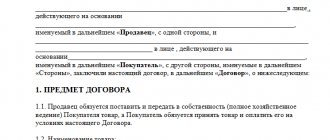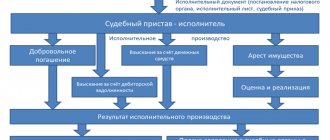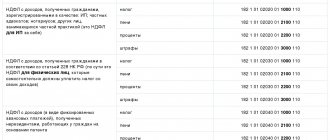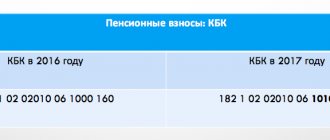Penalty - with or without VAT
Many accountants are wondering whether the penalty is calculated with or without VAT, how to correctly determine its size and which regulatory document to refer to in order to avoid further penalties from regulatory authorities.
Two answers can be given to this question, based on completely opposite points of view of specialists and officials:
- Value added tax is charged on collection, since the tax base for it is made up of all amounts that are associated with payment for sold products (clause 2, clause 1, article 162 of the Tax Code of the Russian Federation).
- VAT is not charged due to the fact that, according to Art. 331 of the Civil Code of the Russian Federation, the agreement on collection is an independent document of title, separate from the main contract, and collection is not directly related to the sale of goods (Letter of the Ministry of Finance of Russia dated 06/08/2015 No. 03-07-11/33051).
Let's look at each position in more detail.
The first point of view of officials is that the penalties that the seller receives from the buyer for late payment are directly related to payment for the goods, and therefore they must be included in the tax base for value added tax. This position is confirmed by Letters of the Ministry of Finance of Russia No. 03-07-11/311 dated 08.17.2012, No. 03-07-11/1 dated 05.18.2012 and No. 03-07-11/222 dated 09.11.2009, but at the moment no There is not a single judicial precedent to support this point of view of experts. According to the Ministry of Finance, penalty obligations are determined in the terms of the contract and, in fact, act as one of the pricing tools for goods sold, therefore they must be included in the tax base (Letters of the Ministry of Finance of Russia No. 03-07-11/64436 dated 09.11.2015, No. 03 -07-15/6333 from 03/04/2013).
As for the second position, officials, in response to the question whether the penalty is subject to VAT or not, argue that the penalties received by the seller are sanctions imposed on the buyer for violating his obligations, that is, payment terms. That is why fines and penalties have nothing to do with the sale of products and should not be included in the tax base (Resolution of the Presidium of the Supreme Arbitration Court of the Russian Federation dated 02/05/2008 No. 11144/07). It is this position that answers the question of whether a penalty based on a court decision is subject to VAT. There are many official court decisions confirming that value added tax should not be taken into account when calculating penalties.
To date, disputes continue, and experts cannot give an unambiguous and legally enshrined answer to this problem.
Simple examples of calculating VAT penalties
Organizations and individual entrepreneurs that conduct business activities must make all required obligations, otherwise penalties for VAT and other deductions will be charged. Payment must be made on time; violation of the rules leads to sanctions.
The amount of the VAT penalty depends on the size of the violation of legal norms. To calculate how much VAT penalties you need to pay, you need to use a special formula or an online calculator.
VAT penalties are the most common sanctions applied by the tax service. This is due to the fact that the tax is quite complex and difficult to calculate. In this regard, organizations and individual entrepreneurs are recommended to familiarize themselves in more detail with situations that may cause sanctions to be imposed.
Which position should a taxpayer organization choose?
Each institution must independently decide whether or not to include penalties in the tax base for value added tax. If the penalties received are in no way related to the sale of goods, works or services, then VAT is not charged on the penalty under the contract. If the manager has a different opinion, then the tax should be taken into account when calculating penalties and fines.
In any case, management needs to reflect its position in the accounting policy, justifying in detail the chosen method of accounting for sanctions.
What are penalties and who pays them?
Penalty for VAT (added value), as well as other taxes, is a type of penalty, a sanction. A penalty is assessed if a person fails to fulfill obligations in a timely manner. The calculation is made as a percentage of the agreed amount in the contract for each day of delay.
What factors influence the size of the sanction:
- The amount of tax that was not paid on time.
- The number of days that have passed since the last payment date.
- Central Bank refinancing rate.
A sanction may be imposed if the person preparing the report made a mistake when completing the declaration. If a defect was discovered by an employee and he submitted a corrected version on time, there is no need to pay a fine. In addition, a sanction is imposed if the organization did not transfer the advance on time, or the tax authorities revealed violations during an audit of the enterprise.
Invoice for the amount of the penalty: to issue or not
Many counterparties are interested in whether it is necessary to issue an invoice when calculating payment from the overdue amount. According to Article 168 of the Tax Code of the Russian Federation, the seller must issue an invoice when performing an operation to sell products under the terms of the contract.
This does not happen when transferring fines and penalties. The buyer establishes compensation payments under the terms of the agreement, and the amount of deductions is not allocated. The seller, when he has received the amount of compensation for violations due to late payments, must calculate the fee. The seller who receives money associated with the deposit of funds from goods sold must issue an invoice for the amount of funds and register the document.
Is a penalty for violating the terms of the contract subject to VAT?
(see letters of the Ministry of Finance of Russia dated January 11, 2011 No. 03-07-11/01, dated August 16, 2010
No. 03-07-11/356, dated May 20, 2010
No. 03-07-11/189, Federal Tax Service of Russia for Moscow dated April 28, 2011 No. 16-15/41799). And only if the sale of goods (work, services) was not subject to VAT, the amount of penalties received by the seller was also allowed not to be subject to this tax. The Ministry of Finance expressed this opinion in letters dated January 11, 2011 No. 03-07-11/01, dated March 16, 2009 No. 03-03-06/2/44, dated December 2, 2008 No. 03-07-05/49.
However, the courts did not agree with the position of the Ministry of Finance and the Federal Tax Service. The amounts of penalties relate to non-operating income (clause 3 of Article 250 of the Tax Code of the Russian Federation), therefore, they are not revenue from sales.
As stated in the Resolution of the Presidium of the Supreme Arbitration Court of the Russian Federation dated February 5, 2008 No. 11144/07, the amounts of penalties as liability for late fulfillment of obligations received by the company from the counterparty under the contract are not related to payment for the goods, and therefore are not subject to VAT.
Is a penalty imposed by a court decision subject to VAT?
The payer of the penalty does not have the right to deduct VAT, i.e.
k. st. 171 of the Tax Code of the Russian Federation does not contain the corresponding basis for the deduction. Example Start LLC (seller) entered into an agreement with Finish LLC for the supply of products in the amount of 500,000 rubles. on terms of subsequent payment. Products sold are subject to VAT at a rate of 18%. One of the clauses of the contract stated that in case of violation of the payment deadline, the buyer pays a penalty in the amount of 0.2% of the cost of unpaid products for each calendar day.
Finish LLC made payment 10 days later than the due date.
In accordance with the terms of the agreement, Finish LLC paid Start LLC a penalty in the amount of: N = 500,000 rubles. × 10 days × 0.2% = 10,000 rub. The amount of VAT on the penalty was determined by calculation based on the VAT rate on the supplied products: VAT = N / 118% × 18% = 10,000 rubles.
/ 118% × 18% = RUB 1,525.42 Opposite
A penalty has been received from a counterparty: is it necessary to charge VAT?
It is unclear what exact penalties (that is, violation of which terms of the contract) are discussed in the letter.
It can be stated that today there is a law enforcement practice according to which the procedure for imposing VAT on funds received from a counterparty who has violated the terms of the supply agreement depends on the type of penalties.
As a rule, the supply agreement provides for mutual liability of the parties to the agreement.
If the supplier has not fulfilled its obligations (for example, did not deliver the goods on time) and, in accordance with the contract, must pay a penalty to the buyer, the amounts received by the buyer are not included in the VAT tax base, since they are in no way related to payment for goods sold .
This opinion, in particular, was expressed in Letter of the Ministry of Finance of the Russian Federation dated 06/08/2015 No. 03-07-11/33051.
We recommend reading: Refund for goods but not returned
Well, we believe that it should be taken as an axiom and calmly applied in practice.
For what days are penalties accrued?
The sanction is a type of penalty, which is set as a percentage. To calculate VAT penalties, you need to take into account each day of delay following the failure to pay your obligations on time.
The basis for making a payment is the missed deadline for fulfilling obligations. Payment is considered mandatory; in case of evasion of payment, a sanction may be collected in court. To calculate the amount to be paid, you need to know the amount to be paid, as well as the deadline for depositing funds. Afterwards the refinancing rate is determined and the calculation is made using the formula.
Is it necessary to impose VAT on fines and penalties for violation of contractual obligations?
As for the taxpayer-buyer, any amounts of penalties received by him under the contract, including for failure to comply with deadlines for the completion of work (provision of services, delivery of goods), poor quality work, violation of discipline during the execution of work, should not take part in the calculation of the tax base according to VAT.
Rationale for the conclusion: According to paragraph.
1 tbsp. 329, paragraph 1, art. 330 of the Civil Code of the Russian Federation (fine, penalty) is one of the ways to ensure the fulfillment of obligations, determined by law or contract; the amount of money that the debtor is obliged to pay to the creditor in the event of non-fulfillment or improper fulfillment of an obligation, in particular in case of delay in performance. The obligation to pay a particular tax is directly related to the emergence of a corresponding object of taxation for the taxpayer (clause
1 tbsp. 38 of the Tax Code of the Russian Federation).
Penalties under contracts: whether or not to pay VAT
In practice, there are often cases when counterparties do not make payments under the agreement, and in this case penalties are provided. Some stakeholders, in order to minimize the risk of violations, include provisions in contracts for payment of penalties for non-performance.
There are two main types of payments – these include fines and penalties. The amount of payments under the contract is calculated by agreement of the parties. Its indicator is calculated depending on the terms of a specific contract.
It is known that the object of taxation of payments is the sale of goods on the territory of the Russian Federation. The concept of sale includes the transfer of ownership of goods. The tax base for value added deductions is established as the price of products or services sold. The payer’s income, which is associated with the payment settlement, is taken into account. Most often, in practice, sanctions are not classified as sales and are not subject to collection, but there are other opinions.
Penalty: should VAT be included in the calculation?
Although in practice, as a result of the fact that civil legislation does not contain definitions of these concepts, they can be mixed or replace each other. Should I charge VAT? This issue has long been a source of controversy between officials and taxpayers. Let us briefly recall its background. In accordance with the wording of subparagraph 5 of paragraph 1 of Article 162 of the Tax Code, which was in force until 2001, the VAT tax base included sanctions received for non-fulfillment or improper execution of agreements (contracts) providing for the transfer of ownership of goods, performance of work, provision of services.
At the same time, sanctions for delay in proper fulfillment of an obligation and (or) for non-fulfillment of a monetary obligation were taken into account when determining the tax base in terms of the excess of amounts received over amounts calculated based on the refinancing rate of the Bank of Russia. From January 1, 2001, this subparagraph was abolished by the Federal Law of December 29 2000
Calculation of penalties using an online calculator
The actual question is how to calculate VAT penalties. To do this, you can use an online calculator, or calculate penalties using special formulas. To use the calculator, you need to select which tax should be calculated, select the payment date that was set, and the date of actual payment.
To calculate the formula, you need to multiply the following values:
- The amount of the contribution not paid on time.
- Refinancing rate/300.
- Number of days payment is delayed.
This formula is relevant if the delay is less than thirty days. Starting from 31 days, the contribution amount must be multiplied by the refinancing rate divided by 150. The resulting value is multiplied by the number of days of delay. Thus, the longer the overdue debt is not paid, the greater the size of the sanctions will be.
Sample payment order for VAT payment
In case of failure to pay the obligation on time, the defaulter will have to calculate a penalty, which must subsequently be included in the budget. When filling out a payment form, it is important to pay attention to the details that are related to VAT.
That is, in the order you must indicate the status of the payer, your details, as well as the recipient. The recipient will be the Federal Tax Service, where the person is registered. The type of transaction, the order of payment, the payment identifier, the OKTMO field, the KBK field, the basis for the payment, the tax period, the date of signing the declaration in which the tax was calculated should be displayed.
In the payment order for the penalty, if the person has calculated it and is paying it independently, it is necessary to display the BCC for it, the basis for the payment, and indicate in the purpose of the payment that payment is being made under sanctions. If payment is made on demand, then the basis for payment will be repayment of the debt at the request of the Federal Tax Service.
Penalties for late payments are subject to VAT: in what cases?
Moreover, if the debtor violates contractual obligations, then he is obliged to pay penalties to the creditor - in accordance with current legislation or specified in the contract (Article 330 of the Civil Code of the Russian Federation). In this regard, the question arises: are penalties subject to VAT?
If yes, then in what cases? Read more about penalties on our website:
- ;
- .
- ;
If penalties are received as part of the debtor’s failure to fulfill obligations, they do not form the tax base for VAT, since they do not relate to the price of the goods and are not related to its payment. Therefore, based on Art.
162 of the Tax Code of the Russian Federation, such penalties are not subject to VAT (Resolution of the Presidium of the Supreme Arbitration Court of the Russian Federation dated February 5, 2008 No. 11144/07). The regulatory authorities recommend that the seller be guided by this resolution of the Presidium of the Supreme Arbitration Court of the Russian Federation regarding penalties as a measure of liability for late payment for goods (letters of the Ministry of Finance of Russia dated October 5, 2016 No. 03-07-11/57924, dated October 30, 2014 No. 03-03-06/1/ 54946, 03/04/2013 No. 03-07-15/6333, sent by the Federal Tax Service of Russia for information to lower tax authorities by letter dated 04/03/2013 No. ED-4-3/ [email protected] )
We recommend reading: Standard of medical care for chronic pancreatitis








